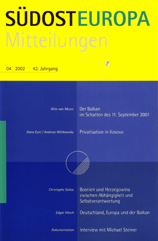Der Balkan im Schatten des 11. September 2001
The Balkans in the Shadow of 9/11 2001
Author(s): Wim van MeursSubject(s): Politics / Political Sciences
Published by: Südosteuropa Gesellschaft e.V.
Keywords: War on Terror;9/11; risk of terrorism; Balkans; EU integration for South-Eastern Europe
Summary/Abstract: The "War on Terror" has marked a reorientation of US foreign policy, although a tendency toward "benign neglect" for the Balkans predated September 11th. By now it is common understanding that the Balkans are a burden for Europe to shoulder with their new capabilities for military conflict-prevention and diplomatic crisis-management. The international community and its regional partners have been alerted to the risks of terrorism in the Balkans and increase their efforts to combat actual terrorists and structural causes. Thus, Justice and Home Affairs would be a key policy subject in a possible strategy of differentiated EU integration for South-Eastern Europe, and being a region of instability is unacceptable within a continental pax europeana. With terrorism as a pivotal issue in national politics and media, allegations of connections between Islamic "regimes" in the Balkans and the Taliban or AI-Qaida soon began to appear. Fragile states, criminal activities and porous borders are competitive advantages of the Balkans for terrorists. The Western reflex might be a preference for stronger, well-functioning states in the region. The allegations, however, were too obvious a ploy to sway the West from a structural and long-term approach. Yet, if the current trend towards short-lived strategic alliances and exit-strategies persists in the War on Terror, European policies for the Balkans - a regional approach of intensive dialogue and perspectives of stabilisation and integration – may eventually be affected by proxy.
Journal: Südosteuropa Mitteilungen
- Issue Year: 2002
- Issue No: 04
- Page Range: 4-15
- Page Count: 12
- Language: German
- Content File-PDF

